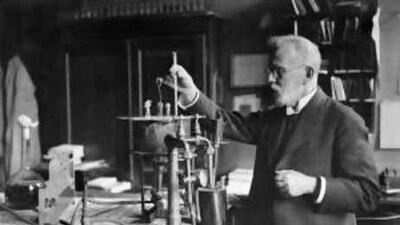The simplest things are often the most profound. Such is the case with methylene blue, used as a simple stain for cells in chemistry and biology experiments for more than two centuries that now shows potential as a treatment for Alzheimer's and Parkinson's diseases. The latest hope to fight dementia is a basic dye that forms a blue solution when it is dissolved in water. Over the past two centuries, the chemical compound's benefits have been found to be more than just cosmetic, treating a slew of different illnesses.
Just how methylene blue has so many therapeutic properties is still a mystery, though scientists believe it may stem from its ability to convert the abnormal blood protein methemoglobin, which cannot carry oxygen, back into haemoglobin, which can. In the late 1800s, it was tested successfully as a treatment for methemogloinemia, also known as "blue baby syndrome", an often fatal infantile disorder in which a lack of oxygen turns the skin to a greyish hue. Paul Ehrlich, a German scientist, who also discovered the benefits of chemotherapy, used the compound to successfully treat malaria in 1891.
New research undertaken by the Children's Hospital and Research Centre in Oakland, California, and Claude Wischik, of the University of Aberdeen in Scotland, suggests that the simple organic dye may have its most important use to date as a cheap new "wonder drug" for Alzheimer's and Parkinson's diseases. A team led by Dr Hani Atamna of the Oakland research centre announced in March that methylene blue, used at a very low concentration, showed "very encouraging" results in delaying the ageing of cells in mice. A presentation at the International Conference on Alzheimer's Disease in July by Dr Wischik took the development further, announcing that a treatment using methylene blue was found to be twice as effective for Alzheimer's sufferers in clinical trials as other drugs on the market.
Alzheimer's has perplexed scientists for decades in part because the reasons and mechanisms that influence its onset are still not completely understood. The best guess by researchers is that its devastating impacts begin when protein plaques aggregate in the brain's neurons. Like plaques in arteries that cause heart problems, plaques in the brain's neurons create memory problems, interfering with the electrical firings necessary for proper cognitive function. Whereas scientists know that cholesterol and saturated fats contribute to plaque in the arteries, they do not have a similar understanding for what causes them to occur in the brain.
One particular protein, the Tau protein, has been found to collect in the neurons of Alzheimer's sufferers and is difficult to control once it starts growing. The aggregation of the Tau protein also kills brain cells by preventing mitochondria, the so-called cellular "power plants", from doing their job. Dr Wischik found that methylene blue could stop the Tau protein, and allow mitochondria to strengthen cells.
The concentration of the dose of methylene blue required is very low, according to Science Daily; treating Alzheimer's sufferers with 60mg of a methylene blue chloride solution for 50 weeks caused an 81 per cent decrease in the average cognitive decline of the patients studied by Dr Wischik. As serendipitous as this find appears, Dr Nabil Naja, a geriatrician who is also the vice-president of the Alzheimer's Association of Lebanon, cautioned that it was perhaps too early to be too enthusiastic about methylene blue's potential. "I'll wait until the final phase of study before I decide," he said. "We don't know if it will damage any brain cells yet."
Indeed, high concentrations of methylene blue have been known to damage the brain, but it was not until recently that scientists tried applying the chemical compound in concentrations that were not fatal to other cells. Diane Mansour, one of the founders of the Alzheimer's Association of Lebanon, said that the onset of the disease is "one of the most neglected subjects in the entire Arab world today". She estimates that there are at least 1.5 million people in the region who could have the disease.
There are a number of drugs on the market designed to slow the degradation of the neurotransmitters in the brain. In the United States, prescribing these minimally effective treatments has made Alzheimer's the third-most expensive disease to treat, costing the government US$100 billion a year (Dh367bn), said Dr Naja. One of the advantages of a drug based on methylene blue would be its low cost. But - perversely - that could also hinder its development as a treatment. Methylene blue was discovered so long ago it may be difficult to patent, which would make it less attractive to large pharmaceutical companies hoping to find the most effective mechanisms to deliver it.
Some researchers believe that methylene blue could have the potential to become as commonplace and low-cost as aspirin, which has long been prescribed as a cheap blood-thinner for people with heart disorders. The Daily Telegraph, in London, reported that such an Alzheimer's treatment might arrive in pharmacies within five years, and cost as little as £2.50 (Dh17). While this would provide welcome relief for healthcare systems dealing with rapidly ageing populations, particularly in the western world, there are many trials yet to be done.
@email:mkwong@thenational.ae

